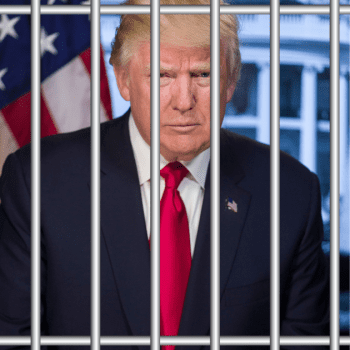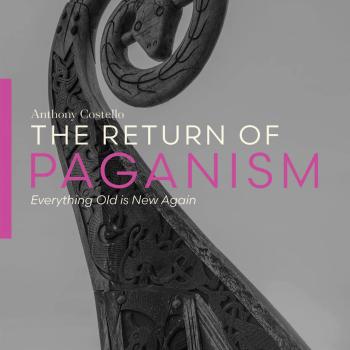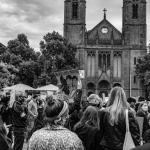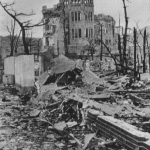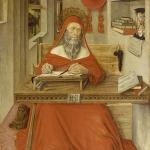At a church in Southern California, not far from the U.S.-Mexico border, two Middle Eastern men made their way onto the stage. One of them, a Kurdish-American pastor, began to share his life story in Arabic, as the other, a minister from Israel, translated it into English.
“Love Your Enemies”
The pastor who shared his story is Azad Barwari. Over twenty years ago, Azad was a nominal Muslim, living over seven thousand miles away, in Iraqi Kurdistan. One day he opened a Bible and began to read the Sermon on the Mount. He was struck by Jesus’ words in Matthew 5:43-44:
“You have heard that it was said, ‘Love your neighbor and hate your enemy.’ But I tell you, love your enemies and pray for those who persecute you, that you may be children of your Father in heaven.”
This passage went against everything Azad had seen in his religion and culture. At one point in his message, he explained:
In all my life, I never heard about loving your enemy. In the Middle East, we lived a long history of battles. Our minds were filled with thoughts of hatred and anger. Kurds were always considered second-class citizens, even though we are Muslims. But because the Quran is not the word of God, you find in it enmity. You don’t find in it freedom. Islam teaches ‘whoever changes his religion, kill him. ‘
Azad was moved by the compassion and love Jesus showed to those who despised him. He wanted to become a Christian, but he knew that in his part of the world, this decision could cost him dearly. His relatives inevitably learned of his interest, and were less than pleased:
When my family saw the gospel in my house, they said ‘Return it or burn it.’ I said ‘I’m not going to burn it or return it.’ I didn’t know what would happen to me. Eventually, my family gathered to kill me. I thought to myself ‘I didn’t hurt anybody. I didn’t kill anybody. I didn’t do anything wrong. Why do you want to judge me and kill me?’
Azad’s voice cracked with emotion, and he warned that:
Islam does not give freedom. There are millions and millions in the Muslim world that do not have freedom. Many are afraid to take this choice. Thank God for America. You’re living in this country. Thank America. You have freedom to express yourself. No one can stop you. Not the President. Not Congress. The Constitution gives you freedom.
From Outcast to Prisoner
Before Azad were two paths: to choose Christ, facing total rejection and possible death at the hands of his own people, or to reject Christ and keep living as a nominal Muslim. He chose Christ, but he needed a way to preserve his life. He made a decision that would ultimately get him incarcerated:
I heard that in Lebanon there were Christians, so I fled to Lebanon. I had neither power, nor possessions. Emotionally, I was destroyed. I thought ‘Where am I going to go? What am I going to do? What am I going to say?’ I came to know a Christian family. The woman took my hand and took me to church and introduced me to the pastor. Since I did not have residency status in Lebanon, I was faced with time in prison. My judgment was $35 and a month in prison. I ended up staying in prison 21 months. I refused to go back to Iraq. At that time, the government of Iraq was destroyed. There was no stability and they wanted to force me to go back. The Iraqi ambassador came and said he would return me by force to Iraq. I didn’t have anybody. No lawyer, no money; and now even the prison was rejecting me. I sat and prayed. All the doors around me were closed. I looked up to heaven. One night I prayed a lot. Jesus Christ appeared to me in a dream. He said, ‘Come to me.’
It was there in the hell of prison that Azad found deep intimacy with the God of the Bible. He shared that:
In prison I quit smoking, and the Lord changed me. I needed peace; he gave me peace. I needed forgiveness; he gave me forgiveness. I was weak. He gave me strength. My life was a mess. I felt he was my Father. I knew he was listening to me. In Islam we knew Allah was very far away.
Azad eventually left prison in 2005 without any help. One day his name was called, and he was simply told to get his clothes and go. Unfortunately, he was homeless, but he stayed at a shelter for the next nine months. Eventually, he came to know the Evangelical Free Church in Beirut, and became a minister of the gospel:
In 2006, I planted the first Kurdish Christian church in Lebanon and the Lord used us powerfully. We sang in three languages: Arabic, Kurdish, and Armenian. When the Lebanese Christians heard about an ex-Muslim Kurd who is leading a church, they wanted to come see. And they were amazed when they saw me. They were amazed to see the Muslim Kurds coming to Christ. We baptized many Kurds.
Global Ministry
At one point, the Lebanese government wanted Azad to leave Lebanon. He applied to the United Nations, which accepted him as a refugee. This transition eventually brought Azad the opportunity to minister on a much larger scale:
In 2009, I came to America. I lived in Atlanta, Georgia and attended first Baptist church. I was there for a year and then they sent me as a missionary to Nashville in 2010 to minister to the Kurds. Then the Lord opened the door for me to have a television ministry in Michigan. I presented the very first Christian Kurdish program ever. In 2012, I had communications with Father Zakaria Botros. Father Zakaria is the ‘Billy Graham’ to the Muslim world. He is a born-again Coptic priest who was given a 60-million-dollar bounty on his head from al-Qaeda because of his effectiveness at preaching the gospel to Muslims. In 2013, we started the first live Kurdish language Christian program on satellite television. It was the first time we had Kurdish Bible reading and Christian prayer on TV. I also sang and played my Kurdish guitar. It was the first time the Kurds heard on TV comparisons between what’s in the Bible versus the Quran.
Azad’s television program was seen by millions of people throughout the Muslim world. In his program, he explained the life and teachings of Jesus, and he exposed some of the dark facts about Islam and its founder, the Prophet Muhammad. His candor won praise from many viewers, but it also elicited the wrath of many others. Azad began to receive numerous death threats, which he would eventually pass on to the FBI.

My Friendship with Azad
I met Azad in 2017 while I was pursuing graduate studies in Southern California. I went to a conference on Islam, and he was part of a panel of speakers who all came from different parts of the Muslim world. Each shared their stories of how they became Christians through great difficulty and resistance. I was so inspired by their lives that when the conference ended, I asked the organizer if I could meet with any of them for coffee to hear more. He went and talked to them and came back to me, saying “Pastor Azad will meet you now.” Azad walked up to me, and after we exchanged names, he said “You are my brother. I love you. Tomorrow you can come to my house for dinner.”
That encounter began a friendship of more than six years. To this day, I have never met anyone who lives out the gospel like Azad. I have seen him routinely serve people of the very religion that calls for his murder. His position has always been that while he hates Islam, he wholeheartedly loves Muslims. He is well aware that many Muslims love and respect him and are wonderful people, but he is also intimately aware of the dark side of Islamic teaching. Through the course of our friendship, Azad has continued to receive death threats from Muslims, including some who call his personal cell phone number. I have never once seen Azad reconsider his mission or bow down in the face of threats and intimidation. He holds no fear of death, since he knows deep in his bones that “to live is Christ and to die is gain” (Philippians 1:21). He is not a large man, but he is one of enormous moral and spiritual stature.
Azad has been a role model to me. When I think of his example, I think of the Apostle Paul, saying “I urge you to imitate me” (1 Corinthians 4:16). He is one of the bravest and most loving people I have ever met. He is hospitable: every visit to his home involves more delicious food, coffee, and hot tea than you can take. He is a man of deep compassion, and yet, many people around the world would be thrilled if he were dead. Why do they want to kill my friend? He hasn’t hurt anyone, and he never would. He’s devoted his life to serving the marginalized. What is his crime? His only “crime” is that over two decades ago, he decided to follow Jesus of Nazareth, the great Lover of Enemies. And ever since then, he has not stopped speaking out about it. No matter what happens to him, he will never stop, even until his last breath.




